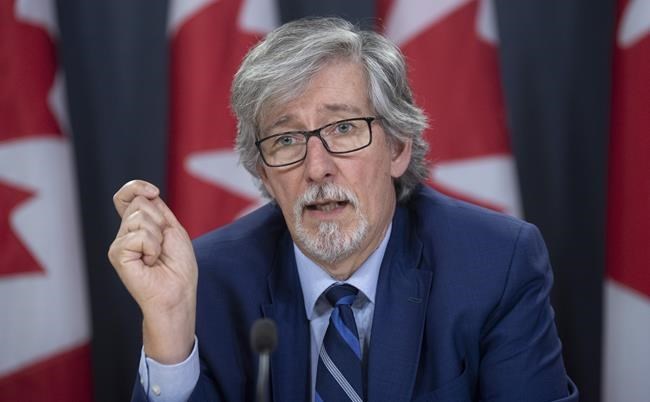OTTAWA — Privacy watchdogs say U.S. firm Clearview AI's facial-recognition technology resulted in mass surveillance of Canadians and violated federal and provincial laws governing personal information.
In a report Wednesday with three provincial counterparts, federal privacy commissioner Daniel Therrien said the New York-based company's scraping of billions of images of people from across the internet was a clear violation of Canadians' privacy rights.
Clearview AI's technology allows for the collection of huge numbers of images from various sources that can help police forces, financial institutions and other clients identify people.¬Ý
The report by Therrien and privacy-protection authorities for Alberta, British Columbia and Quebec said Clearview AI’s technology allowed law enforcement and commercial organizations to match photographs of unknown people against the company’s databank of more than three billion images for investigation purposes.
The probe concluded that Clearview AI had amassed highly sensitive biometric information without the knowledge or consent of individuals.¬Ý
The watchdogs said this created a risk of significant harm to people, noting most of them have never been, nor ever will be, implicated in a crime.
"This is clearly unacceptable," Therrien told a news conference.
Clearview AI told the investigators that Canadian privacy laws do not apply to its activities because the company does not have a “real and substantial connection” to Canada, and that consent was not needed because the information was publicly available.
The commissioners rejected these arguments.
The watchdogs found Clearview AI not only collected the images of Canadians but actively marketed its services to law-enforcement agencies in Canada.
The RCMP became a paying customer and a total of 48 accounts were created for law enforcement and other organizations across the country, the commissioners said.
Therrien announced last year that Clearview AI would stop offering its facial-recognition services in Canada in response to the privacy investigation.
The move included the indefinite suspension of Clearview AI's contract with the RCMP, its last remaining client in Canada.
However, the company rejected the commissioners' recommendations to stop collecting images of people in Canada and delete previously collected images and biometric details.
The watchdogs warned Wednesday that if the company continues to resist, they will pursue other actions available to them under the law.
Therrien's office is completing a related investigation focusing on RCMP use of Clearview AI's technology.
The company says it aims to help law-enforcement agencies solve the toughest cases, and its technology comes with strict guidelines and safeguards to ensure investigators use it only for its intended purpose.
Doug Mitchell, a lawyer for the firm, said Clearview AI collects only public information from the internet, which is explicitly permitted under Canadian privacy law.
"Clearview AI is a search engine that collects public data just as much larger companies do, including Google, which is permitted to operate in Canada," Mitchell said Wednesday.
Conservative MP Michael Barrett tweeted that Clearview AI should appear before the House of Commons information, privacy and ethics committee "to be held accountable for their actions."
Therrien and his provincial counterparts are developing guidance for law-enforcement agencies on the use of facial-recognition technologies. They expect to publish guidelines for consultation this spring.
Public Safety Minister Bill Blair lauded Therrien's efforts and said the government would "continue to work with him" to ensure Canadians' privacy is respected.
Dozens of groups and individuals working to protect privacy, human rights and civil liberties want the Trudeau government to ban the use of facial recognition surveillance by federal law-enforcement and intelligence agencies.¬Ý
In an open letter to Blair last July, they called the technology “highly problematic,” given its lack of accuracy and invasive nature, and say it poses a threat to Canadians' fundamental rights.
They told the minister that in the absence of meaningful policy or regulation governing facial recognition, it cannot be considered safe for use in Canada.
OpenMedia, which works to keep the internet surveillance-free, said Wednesday it should never have been possible for police to adopt Clearview AI's tool.
"Essentially, Clearview AI makes everyone a suspect every time the police use it," said OpenMedia's Bryan Short.
A Quebec photographer wants a judge to order the RCMP to destroy all the images of Canadians it obtained through the tool.
Ha Vi Doan’s proposed class-action lawsuit in Federal Court seeks damages for her and other Canadians whose photos and related information were allegedly part of the massive database compiled by Clearview AI.
Her lawyer, Lev Alexeev, said the commissioners' report confirms that Clearview AI "engaged in illegal mass surveillance."
This report by The Canadian Press was first published Feb. 3, 2021.
Jim Bronskill, The Canadian Press




